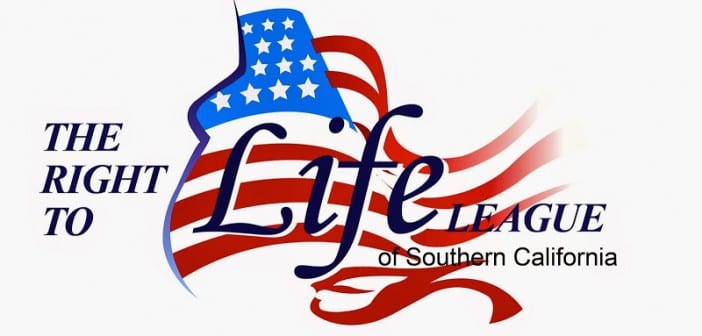In July, I had the opportunity to visit the Right to Life League of Southern California while vacationing on the West Coast. I wanted to take the opportunity to meet some Pro-Lifers while I was there, and the League’s headquarters were within driving distance, in Pasadena. I called to set up the meeting and was fortunate that the Director, Anne Hennessy, was in the office and available for an interview.
The office is situated on the second floor of a business park. It is inconspicuous and humble, as many Pro-Life offices are. One would not imagine that life-saving work was being carried out in that simple office building day in and day out. The building is especially modest in comparison with the much more spacious and attractive amenities owned by a Planned Parenthood across the street.
I was warmly greeted by Anne, a native of Australia. She introduced me to the staff members who were there – all of whom have their own stories of involvement in the Pro-Life movement, and I wished that I could interview each and every one of them. Often, it is impossible to introduce a full-time Pro-Life activist with a tidy, one-line job description. The employees at the Right to Life League of Southern California were no exception. Anne introduced me to employees who juggle multiple titles on a daily basis, depending on what the League’s needs are at any given time.
I pulled up a chair at Anne’s desk and she told me more about her roots in the Pro-Life movement, the origins of the Right to Life League of Southern California, and her vision for the future.
I asked Anne how the Right to Life League of Southern California came to be. The League, I came to find out, is the oldest Pro-Life organization in the country. It was founded in response to the Bielenson bill, which introduced legal abortion to California.
“About a hundred Pro-Lifers went up to Sacramento and asked to speak with then-Governor Reagan,” Anne told me. “His staffers gave them only fifteen minutes of the governor’s time, but the meeting went on for hours. Reagan said ‘nobody told me this about abortion before. I’m obliged to sign this bill but I will never again take a pro-abortion stance.’ This was 1967, and the Right to Life League was incorporated in 1969.” That was four years before Roe v. Wade, the federal law that legalized abortion nationally.
California has been fighting the abortion battle longer than most of America. I asked Anne if there were Pro-Life challenges specific to California that other states do not have to face – or at least, not to the same degree. She said there are, because – especially in Southern California – many people have a tendency to just “go with the flow,” and not question the law. Anne said that, if her organization had an unlimited budget for one thing, it would be a TV campaign to inform Californians about their maternal assistance clinics.
I asked Anne how long she had been involved in the movement, and what initially inspired her to become involved. Anne was raised in a home where the Pro-Life ethic was basic morality. She said, “It’s always made sense to me. I just grew up believing you don’t have the right to kill people.” Anne’s long history of volunteer work primed her for a career in the Pro-Life movement.
Prior to joining the Right to Life League, Anne was president of the Huntington auxiliary that raised money for breast cancer research. After her daughter graduated, Anne began searching for a job, and a friend thought she would be a good fit for the position at the Right to Life League, which was looking to hire at the time. She submitted her resume, and began her first job in the Pro-Life movement as the Director. “That was seven years ago. I came in without any particular experience in the Pro-Life field except that I have always been inclined that way.”
The Right to Life League of Southern California has many forms of ministry and outreach, primary among which is their affiliated pregnancy medical clinics. The League helps a handful of clinics stay fully operational in the area by providing them with policies and procedures, which are regularly updated by an RN, and bookkeeping. By assisting with the administrative work at these clinics, the League gives clinic staffers the freedom to focus more on the ministry and one-on-one relationships with mothers in need.



